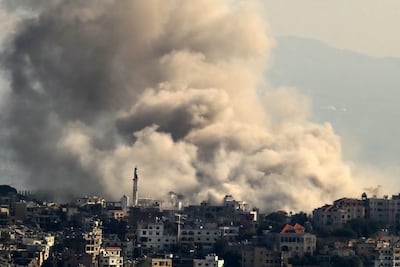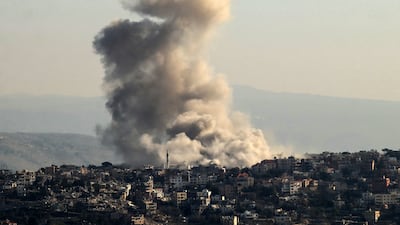Live updates: Follow the latest on Israel-Gaza
On Monday afternoon, an Israeli strike landed a few hundred metres from Sari Dakrouni, a Lebanese farmer living in the southern town of Marjayoun. Mr Dakrouni, one of the few who chose to remain in Marjayoun when the war between Israel and militant group Hezbollah escalated in September, is no stranger to nearby bombings.
But the latest attack did not happen during wartime. It occurred during a continuing period of ceasefire agreed on between Israel and Lebanon last week. According to the deal, brokered by the US and France, Israel has 60 days to fully withdraw from Lebanon, allowing the Lebanese army to take over.
“It doesn't feel like there's a real ceasefire – they are still striking,” Mr Dakrouni told The National from Marjayoun, about 8km from the border with Israel.
Since the ceasefire began, France has reportedly recorded 52 Israeli violations of the truce, according to Israeli media.
On Monday evening, Israeli carried out a wave of air strikes on southern Lebanon after Hezbollah launched two projectiles towards Israel the first time since the truce was established The rockets were a response to Israel’s breaches, Hezbollah said. According to the Israeli army, the attack caused no injuries. The Israeli strikes, though, killed at least nine people in southern Lebanon, including five people in the village of Haris in Bint Jbeil, and four in Talousa.
Later, Israeli Prime Minister Benjamin Netanyahu – who is wanted by the International Criminal Court for war crimes – said that Israel would respond with force. Two people were killed in separate strikes earlier on Monday, including a member of Lebanese state security on duty in Nabatieh, 12km from the border. State security described the attack as a “flagrant violation” of the 60-day truce. And an Israeli drone hit a military bulldozer near a border crossing with Syria, injuring one soldier, the Lebanese army said.
Nonetheless, the US insisted on Monday that the ceasefire remains in place.
“Broadly speaking, it’s our assessment that despite some of these incidents that we’re seeing, this ceasefire is holding,” Pentagon press secretary Maj Gen Pat Ryder told reporters. “We will continue to work with partners in the region to ensure that the ceasefire has the best potential for succeeding.”
Testing the waters
Diplomatic and political sources told The National that the 60-day ceasefire, agreed under “very vague” terms, is seen as testing the water for Israel, and that anything is possible afterwards. “The Israeli side is attempting to push boundaries and test the limits to determine how far it can go in establishing a new status quo,” said a western diplomatic source, stressing that this was allowed by the “vague” terms of the deal.
The renewed violence was a “clear indicator that nothing is set in stone; everything can potentially go in any direction”. He added that the implementation of the new ceasefire violation monitoring mechanism, which is supposed to monitor violations by both sides and is chaired by the US, the Israeli army, the UN Interim Forces in Lebanon (Unifil) and France, will be crucial if the ceasefire is to last. The source stressed there are still many unknowns about the mechanisms, adding that the stakes will be extremely high during the 60 days, which he described as an “adjustment period”.
For Karim Mufti, these lingering uncertainties are clearly playing in Israel's favour. “The ceasefire will last as long as it’s in Israel’s interests,” said Mr Mufti. “The ceasefire for the Israelis was a win-win because they get a break from the Hezbollah rockets. They keep on doing militarily what they need, but with a much tighter scope.”
The terms, the strength of the actors and who oversees it all play into the nature of an agreement that has been brokered without the usual traditional international mechanisms, he said. “Any peace-building should pass by the UN Security Council, even if it means following up on another resolution. This has been the case in any conflict over the past four decades.”
As a result, there is no oversight or enforceability, allowing Israel to continue to act militarily with impunity, knowing that Lebanon itself has no means of preventing further aggression or calling on the international community to intervene. “The ceasefire is a political act more than it is a military decision. So even though it's being breached every day, it's not in Lebanon's interest to declare it void.”
A volatile situation
In the south, the situation remains very volatile. In Marjayoun, like everywhere south of the Litani River, which is about 29km from the Israel-Lebanon border, the Israeli army has imposed a curfew from 5pm to 7am.
“Israel has secured freedom of movement and operations in southern Lebanon and along the Blue Line. It continues military actions, including infrastructure targeting, surveillance, and supply-chain disruption, under the guise of the ceasefire,” Mr Mufti said, stressing that Israel has “significantly weakened Hezbollah, limiting its military and political agency,
Despite the truce, Israeli forces have fired at journalists covering events in Khiam, a vital battlefield during the war, injuring two reporters, and targeted a funeral procession there on Friday. The National heard heavy gunshots while reporting in Bint Jbeil, only 3km from the border with Israel, which was said to be a warning from the Israeli army not to approach border towns.
In Marjayoun, Mr Dakrouni said residents feel more freedom, with supermarkets reopening and residents returning to check on their houses, if they are still standing. “Still, it feels unstable and people are afraid that the war will return because we hear gunfire and bombing regularly. Most people are waiting for 60 days of calm to be sure the war won't start again before they return,” he said.
MO
%3Cp%3E%3Cstrong%3ECreators%3A%20%3C%2Fstrong%3EMohammed%20Amer%2C%20Ramy%20Youssef%3C%2Fp%3E%0A%3Cp%3E%3Cstrong%3EStars%3A%20%3C%2Fstrong%3EMohammed%20Amer%2C%20Teresa%20Ruiz%2C%20Omar%20Elba%3C%2Fp%3E%0A%3Cp%3E%3Cstrong%3ERating%3A%3C%2Fstrong%3E%204%2F5%3C%2Fp%3E%0A
What can victims do?
Always use only regulated platforms
Stop all transactions and communication on suspicion
Save all evidence (screenshots, chat logs, transaction IDs)
Report to local authorities
Warn others to prevent further harm
Courtesy: Crystal Intelligence
The specs
Engine: Dual 180kW and 300kW front and rear motors
Power: 480kW
Torque: 850Nm
Transmission: Single-speed automatic
Price: From Dh359,900 ($98,000)
On sale: Now
Our family matters legal consultant
Name: Dr Hassan Mohsen Elhais
Position: legal consultant with Al Rowaad Advocates and Legal Consultants.
Studying addiction
This month, Dubai Medical College launched the Middle East’s first master's programme in addiction science.
Together with the Erada Centre for Treatment and Rehabilitation, the college offers a two-year master’s course as well as a one-year diploma in the same subject.
The move was announced earlier this year and is part of a new drive to combat drug abuse and increase the region’s capacity for treating drug addiction.
Key products and UAE prices
iPhone XS
With a 5.8-inch screen, it will be an advance version of the iPhone X. It will be dual sim and comes with better battery life, a faster processor and better camera. A new gold colour will be available.
Price: Dh4,229
iPhone XS Max
It is expected to be a grander version of the iPhone X with a 6.5-inch screen; an inch bigger than the screen of the iPhone 8 Plus.
Price: Dh4,649
iPhone XR
A low-cost version of the iPhone X with a 6.1-inch screen, it is expected to attract mass attention. According to industry experts, it is likely to have aluminium edges instead of stainless steel.
Price: Dh3,179
Apple Watch Series 4
More comprehensive health device with edge-to-edge displays that are more than 30 per cent bigger than displays on current models.
SPECS
Nissan 370z Nismo
Engine: 3.7-litre V6
Transmission: seven-speed automatic
Power: 363hp
Torque: 560Nm
Price: Dh184,500
The biog
Family: wife, four children, 11 grandchildren, 16 great-grandchildren
Reads: Newspapers, historical, religious books and biographies
Education: High school in Thatta, a city now in Pakistan
Regrets: Not completing college in Karachi when universities were shut down following protests by freedom fighters for the British to quit India
Happiness: Work on creative ideas, you will also need ideals to make people happy
The specs: 2018 Genesis G70
Price, base / as tested: Dh155,000 / Dh205,000
Engine: 3.3-litre, turbocharged V6
Gearbox: Eight-speed automatic
Power: 370hp @ 6,000rpm
Torque: 510Nm @ 1,300rpm
Fuel economy, combined: 10.6L / 100km
The specs
Engine: 4-litre twin-turbo V8
Transmission: nine-speed
Power: 542bhp
Torque: 700Nm
Price: Dh848,000
On sale: now
World record transfers
1. Kylian Mbappe - to Real Madrid in 2017/18 - €180 million (Dh770.4m - if a deal goes through)
2. Paul Pogba - to Manchester United in 2016/17 - €105m
3. Gareth Bale - to Real Madrid in 2013/14 - €101m
4. Cristiano Ronaldo - to Real Madrid in 2009/10 - €94m
5. Gonzalo Higuain - to Juventus in 2016/17 - €90m
6. Neymar - to Barcelona in 2013/14 - €88.2m
7. Romelu Lukaku - to Manchester United in 2017/18 - €84.7m
8. Luis Suarez - to Barcelona in 2014/15 - €81.72m
9. Angel di Maria - to Manchester United in 2014/15 - €75m
10. James Rodriguez - to Real Madrid in 2014/15 - €75m
INDIA'S%20TOP%20INFLUENCERS
%3Cp%3E%3Cstrong%3EBhuvan%20Bam%3C%2Fstrong%3E%3Cbr%3E%3Ca%20href%3D%22https%3A%2F%2Fwww.instagram.com%2Fbhuvan.bam22%2F%3Fhl%3Den%22%20target%3D%22_self%22%3EInstagram%3C%2Fa%3E%20followers%3A%2016.1%20million%3Cbr%3EBhuvan%20Bam%20is%20a%2029-year-old%20comedian%20and%20actor%20from%20Delhi%2C%20who%20started%20out%20with%20YouTube%20channel%2C%20%E2%80%9CBB%20Ki%20Vines%E2%80%9D%20in%202015%2C%20which%20propelled%20the%20social%20media%20star%20into%20the%20limelight%20and%20made%20him%20sought-after%20among%20brands.%3Cbr%3E%3Cstrong%3EKusha%20Kapila%3C%2Fstrong%3E%3Cbr%3E%3Ca%20href%3D%22https%3A%2F%2Fwww.instagram.com%2Fkushakapila%2F%3Fhl%3Den%22%20target%3D%22_self%22%3EInstagram%3C%2Fa%3E%20followers%3A%203.1%20million%3Cbr%3EKusha%20Kapila%20is%20a%20fashion%20editor%20and%20actress%2C%20who%20has%20collaborated%20with%20brands%20including%20Google.%20She%20focuses%20on%20sharing%20light-hearted%20content%20and%20insights%20into%20her%20life%20as%20a%20rising%20celebrity.%3Cbr%3E%3Cstrong%3EDiipa%20Khosla%3C%2Fstrong%3E%3Cbr%3E%3Ca%20href%3D%22https%3A%2F%2Fwww.instagram.com%2Fdiipakhosla%2F%3Fhl%3Den%22%20target%3D%22_self%22%3EInstagram%3C%2Fa%3E%20followers%3A%201.8%20million%3Cbr%3EDiipa%20Khosla%20started%20out%20as%20a%20social%20media%20manager%20before%20branching%20out%20to%20become%20one%20of%20India's%20biggest%20fashion%20influencers%2C%20with%20collaborations%20including%20MAC%20Cosmetics.%3Cbr%3E%3Cstrong%3EKomal%20Pandey%3Cbr%3E%3C%2Fstrong%3E%3Ca%20href%3D%22https%3A%2F%2Fwww.instagram.com%2Fkomalpandeyofficial%2F%3Fhl%3Den%22%20target%3D%22_self%22%3EInstagram%3C%2Fa%3E%20followers%3A%201.8%20million%3Cbr%3EKomal%20Pandey%20is%20a%20fashion%20influencer%20who%20has%20partnered%20with%20more%20than%20100%20brands%2C%20including%20Olay%20and%20smartphone%20brand%20Vivo%20India.%3Cbr%3E%3Cstrong%3ENikhil%20Sharma%3C%2Fstrong%3E%3Cbr%3E%3Ca%20href%3D%22https%3A%2F%2Fwww.instagram.com%2Fnikkkhil%2F%3Fhl%3Den%22%20target%3D%22_self%22%3EInstagram%3C%2Fa%3E%20followers%3A%201.4%20million%3Cbr%3ENikhil%20Sharma%20from%20Mumbai%20began%20his%20online%20career%20through%20vlogs%20about%20his%20motorcycle%20trips.%20He%20has%20become%20a%20lifestyle%20influencer%20and%20has%20created%20his%20own%20clothing%20line.%3Cbr%3E%3Cem%3ESource%3A%20Hireinfluence%2C%20various%3C%2Fem%3E%3Cbr%3E%3C%2Fp%3E%0A
Skewed figures
In the village of Mevagissey in southwest England the housing stock has doubled in the last century while the number of residents is half the historic high. The village's Neighbourhood Development Plan states that 26% of homes are holiday retreats. Prices are high, averaging around £300,000, £50,000 more than the Cornish average of £250,000. The local average wage is £15,458.
Godzilla%20x%20Kong%3A%20The%20New%20Empire
%3Cp%3E%3Cstrong%3EDirector%3A%20%3C%2Fstrong%3EAdam%20Wingard%3C%2Fp%3E%0A%3Cp%3E%3Cstrong%3EStarring%3A%20%3C%2Fstrong%3EBrian%20Tyree%20Henry%2C%20Rebecca%20Hall%2C%20Dan%20Stevens%3C%2Fp%3E%0A%3Cp%3E%3Cstrong%3ERating%3A%3C%2Fstrong%3E%204%2F5%3C%2Fp%3E%0A
Batti Gul Meter Chalu
Producers: KRTI Productions, T-Series
Director: Sree Narayan Singh
Cast: Shahid Kapoor, Shraddha Kapoor, Divyenndu Sharma, Yami Gautam
Rating: 2/5



